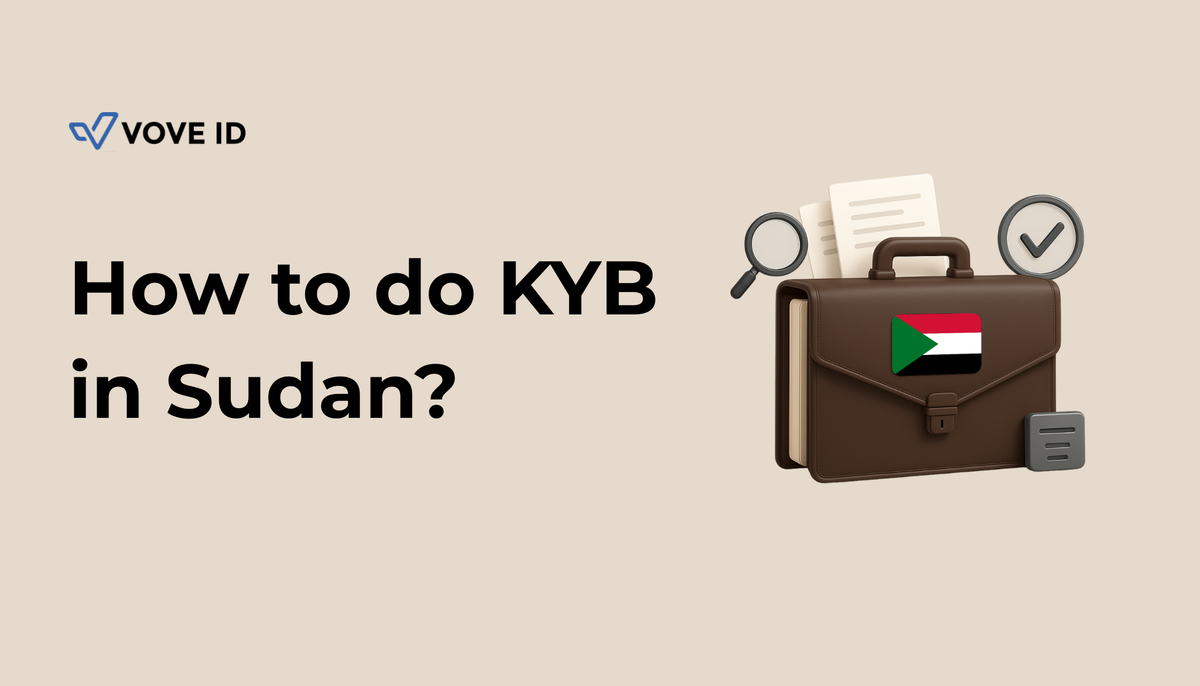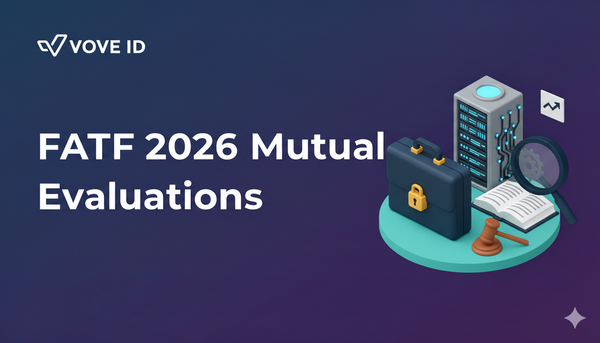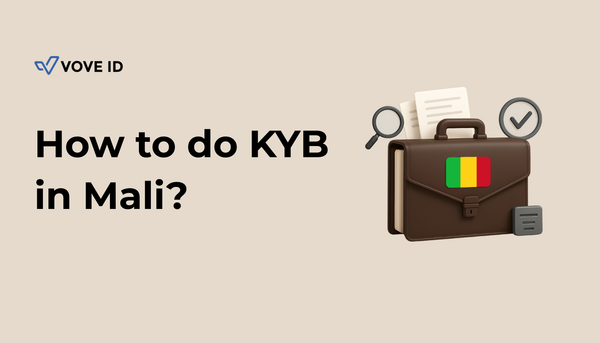KYB Compliance in Sudan: 2025 Guide for Regulated Businesses
Master KYB compliance in Sudan for 2025 with CBOS and FIU rules. Learn challenges and how VOVE ID streamlines secure digital onboarding.

How can your business stay compliant in Sudan’s fast-evolving financial market?
As the country rebuilds its financial system, mastering Know Your Business (KYB) compliance is crucial for fintechs, banks, and payment providers seeking to operate securely and transparently. Under the oversight of the Central Bank of Sudan (CBOS) and the Financial Intelligence Unit (FIU), regulated entities must strengthen their due diligence and adopt digital solutions to stay ahead.
This guide explores Sudan’s regulatory framework, key compliance challenges, and how VOVE ID supports seamless digital onboarding in emerging markets.
Regulatory Framework
Sudan’s Anti-Money Laundering and Counter-Terrorist Financing (AML/CTF) Act of 2014 remains in force as of October 2025. No major amendments have been reported, per CBOS updates, but the regulator continues aligning with Financial Action Task Force (FATF) standards to enhance transparency and international cooperation.
Key regulatory bodies overseeing KYB compliance include:
- Central Bank of Sudan (CBOS) – regulates financial institutions and enforces AML/CFT measures.
- Financial Intelligence Unit (FIU) – monitors suspicious transactions and ensures reporting of high-risk entities.
- Ministry of Justice – supervises company registration and beneficial ownership disclosure.
Together, these institutions form the backbone of Sudan’s compliance ecosystem, emphasizing transparency and verified business ownership.
The KYB Process in Sudan
Financial institutions must conduct Customer Due Diligence (CDD) and Enhanced Due Diligence (EDD) for all business clients. The main steps include:
1. Entity Verification
Confirming company registration details, tax identification numbers, and legal status.
2. Ownership Identification
Determining the structure and identifying Ultimate Beneficial Owners (UBOs) — natural persons who ultimately control or benefit from the business.
3. Risk Assessment
Evaluating exposure to sanctions, politically exposed persons (PEPs), and high-risk jurisdictions.
4. Ongoing Monitoring
Regularly reviewing client activity to detect anomalies or suspicious patterns.
While manual checks remain common, CBOS is encouraging digitization to improve verification speed and accuracy.
Challenges in KYB Compliance
Sudan’s compliance environment presents unique obstacles for regulated institutions:
- Limited Digital Registries: Corporate databases remain partially digitized, slowing verification processes.
- Low Data Integration: Fragmented data systems hinder real-time validation of ownership information.
- Sanctions and Geopolitical Risk: Sudan’s history of U.S. and UN sanctions tied to past conflicts increases the need for robust counterparty verification.
- Connectivity Gaps: Low internet access outside major cities constrains digital onboarding initiatives.
These realities highlight the value of automated, AI-driven KYB systems that streamline verification while ensuring regulatory alignment.
How VOVE ID Supports Digital KYB in Sudan
VOVE ID empowers financial institutions and fintechs to meet compliance requirements efficiently with secure, automated KYB tools.
Through advanced APIs, VOVE ID enables:
- Rapid Business Verification: Authenticate company registration and licensing details using trusted global databases.
- Director and UBO Screening: Identify and verify Ultimate Beneficial Owners (UBOs) and directors with AI-driven eKYB tools.
- AML Risk Analysis: Perform compliance checks against global sanctions, PEP, and adverse media lists.
- Streamlined Onboarding: Ensure regulatory compliance with automated, efficient verification workflows.
For institutions operating in high-risk or data-limited markets like Sudan, VOVE ID provides the infrastructure to build trust and compliance readiness.
Did You Know?
💡 Over 60% of Sudanese SMEs still operate informally, making digital KYB critical for financial inclusion.
💡 The CBOS digital registry program, supported by international partners like the World Bank, is set to expand nationwide in 2025.
💡 The fintech sector is projected to grow by 15–20% in 2025, per industry estimates, driven by digital banking and mobile payments.
💡 Digital KYB solutions can reduce onboarding time by up to 70%, even in low-connectivity regions.
❓FAQs
1. Which institutions must comply with KYB regulations in Sudan?
All entities regulated by the Central Bank of Sudan—including banks, fintechs, and microfinance providers—must verify business clients under AML/CTF obligations.
2. What digital initiatives support KYB modernization?
CBOS is piloting digital registry upgrades in 2025, supported by international partners like the World Bank, to improve data accessibility and verification efficiency.
3. How can fintechs meet CBOS expectations effectively?
By integrating VOVE ID, fintechs can automate document checks, ownership screening, and reporting while maintaining compliance with CBOS and FIU standards.
Conclusion
As Sudan’s financial system modernizes, KYB compliance stands as a cornerstone of growth and trust. Institutions adopting digital verification will gain a competitive edge while contributing to the nation’s economic stability.
👉 Join Sudan’s financial transformation with VOVE ID and start building compliant, trusted partnerships today.




